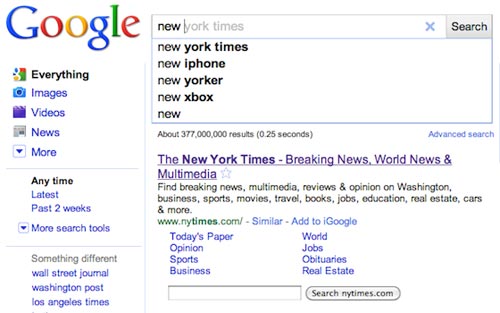Google Instant Search: Finding “it” Quickly
Regular observers of Google and the world of Internet searching call Google Instant Search an aggressive attempt to define the way people use the Internet. The year 2010 may indeed be remembered by some as the year in which this Web-use behemoth redefined searches.
 Is this a truly fundamental change? Earlier this year an article in one of the leading technology magazines heralded the end of the Internet as we know it. That article stated the belief that future Internet use will be about applications rather than about searching and finding. This basic change would takes users from spending time on the search process to arriving and beginning to use the outcome much more quickly.
Is this a truly fundamental change? Earlier this year an article in one of the leading technology magazines heralded the end of the Internet as we know it. That article stated the belief that future Internet use will be about applications rather than about searching and finding. This basic change would takes users from spending time on the search process to arriving and beginning to use the outcome much more quickly.
But does Google Instant Search refine the use of the World Wide Web so completely? Do we, as users, actually arrive at applications instantly? Let’s see what veteran Google-watcher Tom Krazit has to say about this. Keep in mind that Krazit has followed Google on a consistent basis because he considers it “the most prominent company on the Internet.”
Some of the key points Krazit makes about this new search technology are:
- It may confuse searchers at first
- It may cause some gray hairs for the SEO folks
- It may be tough to duplicate
This last factor may be the most important one of all. In the minds of millions of Internet users the word Google is a verb. We don’t “search” the World Wide Web for information. We “google” it. This is a key point made by Krazit and others. Krazit sees Google Instant Search as “a combination of front-end user interface design and the back-end work needed to process results for the suggested queries on the fly.” This is quite different from what other major Internet players have done or will do.
It’s Still Great, Right?
The benefits of Google Instant Search may seem obvious but there are some search aficionados who have questions and concerns about the idea. The technology makes predictions and provides suggestions as to what a might be searching for. These features have cut typing and search time by 2 to 5 seconds, according to Google.
That might seem like great stuff but not for everyone is completely sold. Some people still want to turn this feature off and this can be done through the “Search Settings” link. The company states that this doesn’t slow down the Internet process and adds that the experienced user will welcome the efficiency of Google Instant Search, especially because it doesn’t affect the ranking of search results.
As quick and efficient as Internet searches already were (even a few years ago) Google Instant Search came along as an effort to make the process move more quickly. In its simplest terms, this technology is designed to take viewers to the desired content before they finish typing the search term or keyword. Individuals certainly don’t have to go all the way to clicking on the “Search” button or pressing the “Enter” key.
Logical Extension
 Rob Pegoraro, writing for The Washington Post, states that Google Instant Search is the “next logical extension” of what Google calls the “auto-complete” feature. The journalist does comment, correctly, on our “collective attention span online” and notes that the need for and use of instant-searching tools seems a bit frightening.
Rob Pegoraro, writing for The Washington Post, states that Google Instant Search is the “next logical extension” of what Google calls the “auto-complete” feature. The journalist does comment, correctly, on our “collective attention span online” and notes that the need for and use of instant-searching tools seems a bit frightening.
One thing parents and Web do-gooders won’t have to worry about is the appearance of offensive words and links to obscene destinations. Google has provided filtering capability that will prevent the display of the most common “bad” words, for example.
Pegoraro also expressed the hope that saving 2 to 5 seconds per search doesn’t become “Instant’s primary selling point.” Instant Search continues one of the features of earlier search tools in that it tailors things to the location of the user who has signed in. This certainly sped up the process without Instant Search so it should do the same and more now.
Making Connections
In 2009 a fellow named Jeff Jarvis wrote a book about Google that put the Internet giant in a special place among the Web-users of 21st century. His book carried the title “What Would Google Do?” If this title gives the impression that one Internet company is guiding the online world it’s because Google does this.
A key issue in Jarvis’ book is the connection made between users or between users and providers. Google Instant Search brings the provider/user connection to the conversation level. In a way, this technology mimics how we actually converse with friends and family members. As we construct a sentence and speak it, the listener is already forming thoughts about our subject or point.
Google Instant Search does this and we respond quickly with adjustments and new information. The search tool forms its “opinions” and makes suggestions again. It’s sort of like that annoying guy who finishes our sentences for us and this may be a problem for many long-time Internet fanatics.
With all of this in mind, we should understand that Google’s management team and developers spent a lot of time testing this technology before introducing it. Yet, it isn’t perfect by any means. Slower Internet connections may struggle with Instant Search. As mentioned earlier, the change has caused some concern among those who make their living with search-engine optimization.
One more question: Is Google Instant Search perfect for mobile use? We’ll find out over the next few months.







